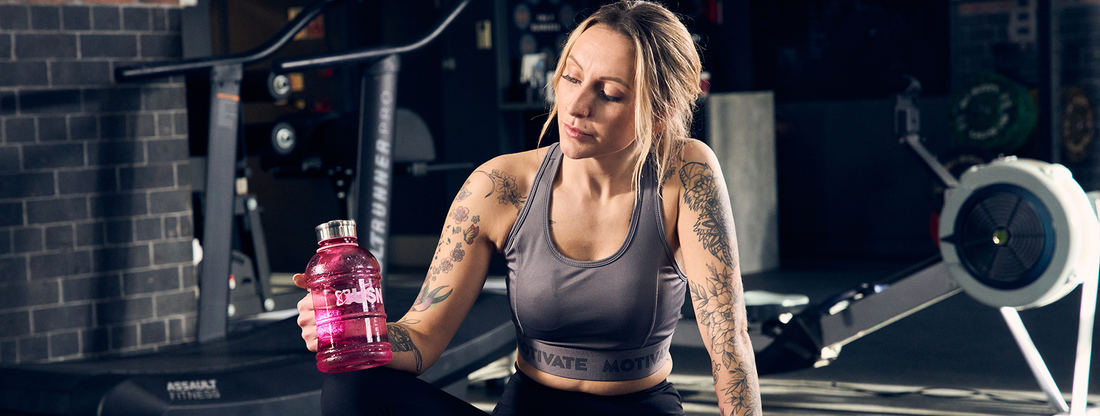
Creatine Weight Gain and Water Retention
August 2024Creatine is one of the most popular supplements in the fitness world, celebrated for its ability to enhance performance and support muscle growth. However, it often raises questions and concerns about creatine weight gain and creatine water retention. In this blog, we’ll explore these topics, providing a clear understanding of how creatine affects your body and debunking some common myths.
Does creatine make you gain weight?
One of the most frequently asked questions about creatine is whether it can make you gain weight. Creatine can lead to weight gain, but it’s essential to understand the nature of this weight gain. When you start taking creatine, your muscles store more water, leading to an increase in weight.1 This creatine water retention is often mistaken for fat gain, but it's not the same.
Creatine helps your muscles retain more water, making them look fuller and more voluminous. This increase in water content is beneficial for muscle growth and recovery, but it can also increase the number on the scale. It's crucial to differentiate between this water weight and fat. Creatine does not make you fat. The weight gained is typically a sign of increased muscle hydration and improved muscle mass.
Creatine and water retention
Creatine causes water retention, as it draws water into the muscle cells, increasing their hydration. This creatine water retention is a normal part of creatine supplementation. It's a sign that creatine is working to enhance muscle performance and recovery.
Will creatine water retention go away?
Many people are concerned about whether the creatine water retention will go away. Once you stop taking creatine, your body will return to its normal water balance over time.2 However, the benefits gained during creatine supplementation, such as increased muscle mass and strength, will remain if you continue to train effectively.
Drinking water and creatine
Proper hydration is essential when taking creatine. Drinking plenty of water helps to manage creatine water retention and supports overall hydration, which is crucial for optimal performance and health. Aim to drink at least 8-10 glasses of water a day to help your body process creatine effectively.
Creatine bloating
When you first start taking creatine, especially during a loading phase, you might notice a bit of bloating. This is because creatine increases both muscle mass and water content in your muscles.
Does creatine make you puffy?
The answer can vary from person to person. Some individuals might experience a feeling of bloating or puffiness when they first start taking creatine due to the increased water retention. This creatine bloating is typically mild and can be managed by staying well-hydrated and splitting your creatine dose throughout the day.
Should you take creatine for weight loss?
While creatine is known for enhancing muscle strength and performance, it doesn’t directly cause weight loss. However, creatine can indirectly support your weight loss goals by improving workout intensity and aiding in muscle preservation during calorie-restricted diets. It helps maintain lean muscle mass, which boosts metabolism and promotes a more toned appearance as you shed fat.3 So, while creatine isn't a magic weight loss supplement, it can be a valuable tool in your fitness arsenal.
Ready to get started with creatine?
Understanding the effects of creatine on your body can help you make the most of this powerful supplement. If you're ready to enhance your performance, increase muscle mass, and improve recovery, explore our range of high-quality creatine products.
Visit our blog for more insights and tips on maximising your fitness potential with creatine.
FAQs
Does creatine cause digestive problems?
Some individuals may experience digestive issues such as stomach cramps, nausea, or diarrhoea when taking creatine.4 These creatine side effects often occur if the supplement is not taken with enough water or if too much is consumed at once. To minimise digestive problems, take creatine with plenty of water and consider splitting the dosage throughout the day.
How do you get rid of creatine bloating?
If you feel bloated after starting creatine, remember that it’s usually temporary and should ease up within a few days to a few weeks. Here are some practical tips to help you minimise those effects and get back to feeling your best:
- Stay hydrated: One of the simplest ways to combat creatine bloating is to drink plenty of water. Hydration is critical to reducing bloating and supporting healthy muscles. Aim to consume an additional 240-480 ml of water daily while supplementing with creatine. Keeping your body well-hydrated helps flush out excess water and maintain balance.
- Choose creatine monohydrate: If you’re worried about water retention, consider sticking with creatine monohydrate. Research shows that this form is safe and effective and less likely to cause water retention compared to other types like ethyl ester and buffered creatine.5 These alternatives don't have the same level of evidence supporting their benefits, so monohydrate is your best bet.
- Skip the loading phase: To reduce or prevent bloating, you should skip the loading phase. Instead of starting with a high dose, begin with a maintenance dose of 3-5 grams of creatine daily. This gradual approach can help your body adjust without the added bloating.6
References
- Creatine Supplementation for Muscle Growth
- Side Effects of Creatine Supplementation in Athletes
- Creatine Supplementation: An Update, Creatine for Muscle and Strength, Creatine and Performance.
- Gastrointestinal Distress After Creatine Supplementation in Athletes: Are Side Effects Dose Dependent?
- Analysis of the Efficacy, Safety, and Regulatory Status of Novel Forms of Creatine
- Creatine Supplementation


